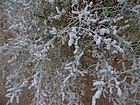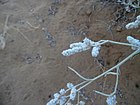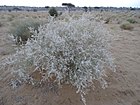Note: This is a project under development. The articles on this wiki are just being initiated and broadly incomplete. You can Help creating new pages.
Aerva javanica - Snow bush
Aerva javanica is a species of plant in the Amaranthaceae family. It has a native distribution incorporating much of Africa and the south-west and south of Asia.
Contents
[hide]- 1 Uses
- 2 Parts Used
- 3 Chemical Composition
- 4 Common names
- 5 Properties
- 6 Habit
- 7 Identification
- 8 List of Ayurvedic medicine in which the herb is used
- 9 Where to get the saplings
- 10 Mode of Propagation
- 11 How to plant/cultivate
- 12 Commonly seen growing in areas
- 13 Photo Gallery
- 14 References
- 15 External Links
Uses
Rheumatism, Cracking of skin, Hemorrhoids, Skin dryness, Skin eruptions, Fever, Vomiting.[1]
Parts Used
Chemical Composition
The plant extract contains ascorbic acid, kaempferol, beta-amyrin and beta-sitosterol. The leaves also contain sitosterol and its glucoside.[2]
Common names
| Language | Common name |
|---|---|
| Kannada | ದೊಡ್ಡ ಹಿಂಡಿ ಗಿಡ Dodda hindi gida |
| Hindi | Safed bui |
| Malayalam | |
| Tamil | Perumpoolai |
| Telugu | Magabira |
| Marathi | Khul |
| Gujarathi | NA |
| Punjabi | NA |
| Kashmiri | NA |
| Sanskrit | Dholphuli, Khul |
| English | Javanese Wool Plant, Kapok Bush, Snow bush |
Properties
Reference: Dravya - Substance, Rasa - Taste, Guna - Qualities, Veerya - Potency, Vipaka - Post-digesion effect, Karma - Pharmacological activity, Prabhava - Therepeutics.
Dravya
Rasa
Tikta (Bitter), Kashaya (Astringent)
Guna
Laghu (Light), Tikshna (Sharp)
Veerya
Ushna (Hot)
Vipaka
Katu (Pungent)
Karma
Kapha, vata shamaka
Prabhava
Habit
Identification
Leaf
| Kind | Shape | Feature |
|---|---|---|
| Simple | 2-7 cm long | leaves are alternately arranged along the stems and are quite variable in shape |
Flower
| Type | Size | Color and composition | Stamen | More information |
|---|---|---|---|---|
| Bisexual | Up to 10 cm long and 10 mm wide | Whitish flowers | Separate male and female flowers are borne on separate plants and Its flowering season is May-October |
Fruit
| Type | Size | Mass | Appearance | Seeds | More information |
|---|---|---|---|---|---|
| Utricle | 1-1.5 mm long | Orbicular | Many | Fruiting season is May-October |
Other features
List of Ayurvedic medicine in which the herb is used
Where to get the saplings
Mode of Propagation
How to plant/cultivate
A plant of drier areas in the tropics and subtropics where it is found at elevations from sea level to 1,900 metres[6]
Commonly seen growing in areas
African forest, Tropical areas.
Photo Gallery
References
- Jump up ↑ Kappathagudda - A Repertoire of Medicinal Plants of Gadag, Page no: 46
- Jump up ↑ Chemical constituents
- Jump up ↑ Common names
- Jump up ↑ Stems and Leaves
- Jump up ↑ Ayurvedic Preparation
- Jump up ↑ Cultivation Details
External Links
- Ayurvedic Herbs known to be helpful to treat Rheumatism
- Ayurvedic Herbs known to be helpful to treat Cracking of skin
- Ayurvedic Herbs known to be helpful to treat Hemorrhoids
- Ayurvedic Herbs known to be helpful to treat Skin dryness
- Ayurvedic Herbs known to be helpful to treat Skin eruptions
- Ayurvedic Herbs known to be helpful to treat Fever
- Ayurvedic Herbs known to be helpful to treat Vomiting
- Herbs with Roots used in medicine
- Herbs with Woolly spikes used in medicine
- Herbs with common name in Kannada
- Herbs with common name in Hindi
- Herbs with common name in Tamil
- Herbs with common name in Telugu
- Herbs with common name in Marathi
- Herbs with common name in Sanskrit
- Herbs with common name in English
- Habit - Perennial herb
- Index of Plants which can be propagated by Seeds
- Herbs that are commonly seen in the region of African forest
- Herbs that are commonly seen in the region of Tropical areas
- Herbs
- Amaranthaceae
- Pages without herbs images









